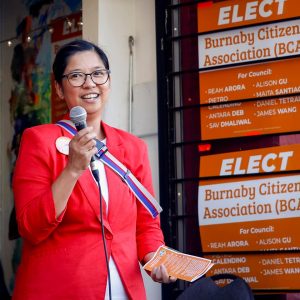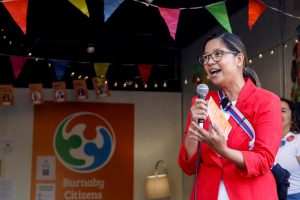Pinay migrants advocate is Councillor
Pinay migrants advocate is Councillor

Maita Santiago
Elected in Burnaby, B.C.
By Nestor Burgos
VANCOUVER, BRITISH COLUMBIA—Driven by her advocacy for greater representation for the Filipino-Canadian community, Maita Santiago ran for but came short of winning a seat in the city council of Vancouver in 1993.
Her failed bid did not stop her from pursuing the community’s vision for more inclusiveness and for advancing migrants rights and welfare.
Twenty-nine years later, on October 15, Santiago was elected to a municipal council seat in Burnaby, British Columbia’s third biggest city and seat of the Metro Vancouver Regional District.
She made history by becoming the first ever councillor of Filipino heritage in Burnaby and the Lower Mainland. She will serve a four-year term from November 2022 to November 2026.
The mother of two from Bulacan province in the Philippines is only the second Filipino-Canadian to win a seat in a municipal council in British Columbia (BC) after Edwin Empinado who was elected as municipal councillor of Kitimat district in 2011.
“I am very mindful of the context of my getting elected as councillor. The political journey of the Filipino-Canadian community started long before and I am grateful to those who came forward because everything that happened since then contributed to this,” Santiago told The Philippine Reporter.
Santiago, an immigration consultant and longtime migrants rights advocate, served as secretary general of the progressive Filipino international migrant group Migrante from 2002 to 2008.
“This campaign is the culmination of the really hard work many community organizers and leaders put in to empowering our Filipino-Canadian community and the tireless effort of other Filipino candidates over the years,” she said in a statement posted on her Facebook account.
“I’m the first Filipino Councillor elected in the Lower Mainland and I’m looking forward to the many others that will follow. And I committed to doing all I can to make sure that happens for my community and many other under-represented ones,” she said.

Filipino-Canadian community leader and migrants rights advocate Maita Santiago joins supporters in campaign rally shortly before the October 15 local elections in Burnaby City in British Columbia
(Photos from Maita Santiago’s Facebook page)
Santiago got the sixth highest number of votes among 27 candidates for the eight-member city council based on results from all of 58 tabulators, according to CivicInfo BC, British Columbia’s information hub.
Burnaby has 163,076 registered voters and with a turnout of 19.78 percent, Santiago got 11,347 from 32,249 votes cast.
Her party, the Burnaby Citizens Association (BCA), continued its traditional dominance in the city’s elections with six candidates for the city council winning. It also swept all the seven seats in the school board elections.
She thanked the BCA and all those who volunteered and helped in their campaign.
She first came to Canada in 1977 as an immigration consultant and has been serving as constituency assistant to Member of the Legislative Assembly (MLA) Mable Elmore.
Elmore was elected MLA of BC in 2009, the first of Filipino heritage in the province.
Santiago’s years of working with community and non-government organizations and everyday folk imprinted in her the need for representation in government bodies especially municipal councils.
“For a long time, others have represented us. The councils are closest to the needs of the people. I have seen the big difference to Filipino Canadians and other racialized communities if there is representation,” she said in an earlier interview.
Filipino-Canadian community leaders welcomed Santiago’s electoral victory.
“The victorious campaign to bring Maita Santiago to Burnaby City Council is a win not only for Maita, the BCA, and the residents of Burnaby, but also a victory for the Filipino community, wherever they are,” Erie Maestro, a retired librarian and a founding member of Migrante-British Columbia said.
Maestro said Santiago won because of what she stands for and earned the support not only of the Filipino community by drawing many into her campaign based on her platform and values on “inclusion, services for all, human rights”, among others.
She cited Santiago’s advocacy “to effect changes especially for the under-represented, the marginalized, and those in precarious status.”
“As councillor, she does not represent the Filipino community alone but all the residents of her home city Burnaby,” Maestro said.
Santiago earlier said her main focus is on more affordable and secure housing options, inclusiveness and the climate crisis.
As a city councillor and one of only two women in the council, she will help push for the eradication of “systemic barriers” against inclusiveness and representation especially of racialized communities and underrepresented sectors.
“We need to hear more voices in City Hall in between elections,” she told The Philippine Reporter.
Three other Filipino-Canadians failed in their bid to win a seat in municipal councils in the province.
Lina Vargas and Amie Peacock ran as independents for the city council of Vancouver, the most populous in this westernmost province. Ramon Bandong ran as candidate of the Surrey Forward party in Surrey, BC’s second most populous municipality.
Vargas, a community organizer, caregiver hairstylist, social worker and gender rights advocate, got the highest number of votes among 11 independent candidates in the crowded electoral race with 60 candidates for 10-member city council.
The Filipino-Canadian community leaders ran based on platforms prioritizing more inclusiveness and diversity in policy-making, affordable and secure housing, transparency, rising cost of living, and other basic issues and concerns affecting residents.
While Filipino Canadians comprise the third or fourth largest visible minority group in BC, only a few have been elected to office.
Elmore said in an earlier interview that campaigning for municipal elections are harder because of the absence of wards or electoral districts.
But she pointed out that the under-representation of the Filipino- Canadian and other racialized communities runs “across the board” in leadership, supervisory and managerial positions in all sectors.
“It is more marked in the Filipino community relative to its size,” she said.
British Columbia with a population of more than 5 million (2021) is the third most populous among Canada’s 10 provinces and three territories next only to Ontario and Quebec.
There are about 145,030 Filipino Canadians in BC, the third biggest concentration next to Ontario and Alberta provinces, based on the 2016 census.
Comments (0)